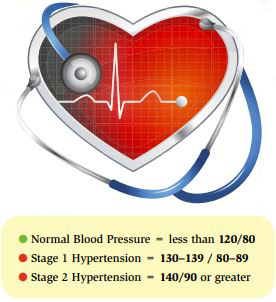Let us start with this little fact: almost half of all adults in the United States are affected by hypertension. Recently published revised guidelines for the detection of high blood pressure mean that 46 percent of all Americans 18 years and older are now considered to have hypertension (otherwise known as high blood pressure). This is a staggering statistic, equating to about 103 million adults in the United States.
The new guidelines from the American College of Cardiology and the American Heart Association define hypertension as blood pressure readings greater than or equal to 130/80. Prior to this change, the standard definition of hypertension was anything equal to or greater than 140/90. With these new, stricter guidelines millions more adults are now considered hypertensive.
What is hypertension?
Imagine your heart as a pump. The heart pumps blood to the rest of the body through pipes called arteries, which — like rubber tubes — can expand and contract. The pressure of blood filling the arteries is what we measure and call blood pressure. If the force of this pressure in the pipes or arteries is too high, that is what we call hypertension or high blood pressure. With the new guidelines, anything equal to or greater than 130/80 is now considered hypertension.
In a perfect world, the top number should be less than 120. This is called the systolic pressure and it is the pressure measured when the blood is filling the artery and it expands. The bottom number is called the diastolic pressure and, optimally, this number should be less than 80. It is the pressure of the artery when the heart is at rest — in other words, when the heart is not pumping blood.
Why are these numbers important?
Your doctor and healthcare providers measure these numbers regularly because hypertension is known as the “silent killer.” Unlike when you have a visible injury, cold or cut, you may not realize anything is wrong unless you get checked regularly by your primary care provider. As the blood pressure in your body increases and stays elevated over time, your risk for complications such as a stroke or heart attack increase significantly.
If you want to avoid any complications from this chronic epidemic, please talk with your healthcare provider and see him or her regularly to help prevent, manage and treat hypertension.
HOUSE CALL MEDICAL PRACTICE LLC
808-726-5062 | Housecallmed@gmail.com
www.housecallmedhawaii.com



Leave a Reply